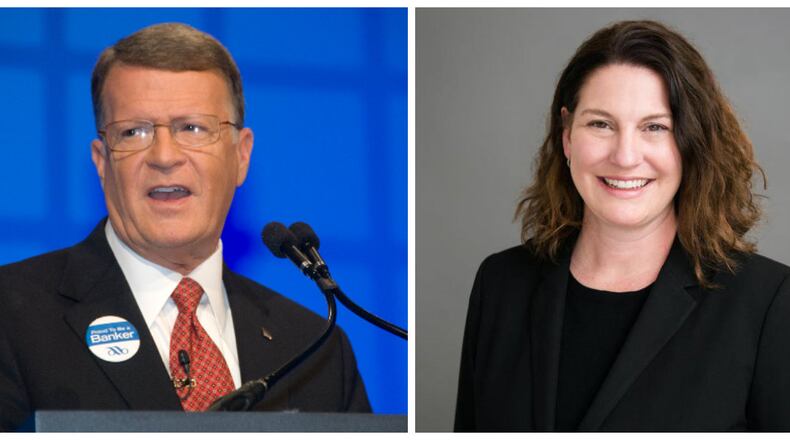RELATED: Senator appointed from four-person field
Wilson, former president and chairman of the board of Lebanon Citizens National Bank, was sworn in in January 2017, appointed to replace Shannon Jones after she resigned to run for Warren County commissioner.
Bitter, a lawyer and former assistant to former President Bill Clinton’s special counsel, also served as national field director for the ReelAbilities Film Festival North America and co-chair of the 2015 Cincinnati event.
RELATED: Bitter facing tough battle in Republican-leaning Senate district
The 7th Ohio Senate District seat represents half of Warren County, parts of northern Hamilton County and a portion of Butler County.
Headed into the final days of the campaign, Wilson held a lead in campaign funds on hand, with $40,725 compared to $18,958 for Bitter, according to pre-campaign filings.
Early voting continues through Monday, Nov. 5. Election Day is Tuesday.
Both candidates answered questions submitted for the newspaper’s Voter’s Guide.
What are the two biggest challenges facing the state and how would you deal with them?
Bitter: Ohio's greatest single challenge is the addiction crisis, at the cost of human lives destroyed and lost. My first priority at the Statehouse is to establish a bipartisan caucus on Addiction, Mental Health, and Disability to develop coordinated, best-practices responses in all these areas. Ohio's second challenge is to educate our population at all ages for a thriving workforce in the new jobs economy. I would create public-private-education-industry partnerships to develop a vision and implement a plan to reach this goal.
Wilson: Every day brings challenges but the two biggest are continuing to create good jobs for Ohio citizens and providing a safety net for those vulnerable citizens that truly need our help. While we are currently experiencing historically low unemployment, we must keep focused on demanding an environment that attracts investment from the private sector and an educational system that fosters workforce development. Less regulations resulting in less government intrusion creating a smaller government sector that results in less taxes and more investment in our economy is the key for long term prosperity in Ohio.
For those citizens severely disadvantaged by poverty, mental illness, developmental disabilities, our very young and very aged, the state has a responsibility to assist in solutions.
Learn about candidates, issues in your area
What makes you more qualified than your opponent to hold this office?
Wilson: I believe that my experience as a U.S. Navy Officer, CEO of a community bank, Lebanon city school board member, trustee of Miami University, a member of the 4th district of the Federal Reserve Board and a community leader have positioned me to successfully serve as an Ohio State Senator. I am committed to using these experiences to fight for the best interest of the citizens of the 7th district and the State of Ohio.
Bitter: To be an effective elected official, I think you have to first be a good listener. I've spent much of my career listening so that I can carefully craft solutions to systemic problems. I understand the political system, having worked in the Counsel's Office as the Assistant to Special Counsel to the President in the West Wing of the White House. I have experienced real-life issues that so many families face, and I bring my empathy to the table to speak for all Ohio families. I have two children with developmental disabilities and I have been an advocate for people with disabilities for much of my career. I want to work for people with disabilities, their caretakers and the broader community of people with mental health conditions or addiction issues to invest in programs that provide a support system and opportunities for success.
RELATED:Warren County primaries set
What is your plan for resolving concerns about the skills gap many Ohio business leaders complain about?
Bitter: Partnerships between high schools, community colleges, universities, and industry are needed to ensure the training of a skilled, flexible workforce. This means providing strong foundations in math, science and literacy; teaching computer skills at all levels; supporting the dignity of skilled trades; developing skills in problem solving and collaboration; and establishing the practice and system of continuous learning for life to keep up with a changing world.
Wilson: The skills gap is the challenge to continue to grow jobs and to continue to move Ohio citizens to more prosperity. Supporting programs and educational opportunities that prepare our workforce is job one for our state and we must double our efforts to increase affordable educational options resulting in training, certifications, associate degrees and advanced degrees. The challenge is to encourage all Ohioans to participate.
About the Author

